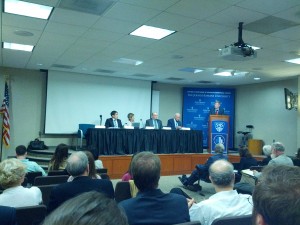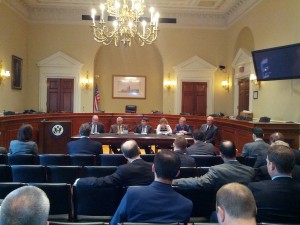WASHINGTON, DC – Against the background of a changing geopolitical environment in Eurasia and the ongoing withdrawal of U.S. troops from Afghanistan, U.S. and Kazakh experts have called for more structured relations between Washington and Astana and a visit by the U.S. president to Kazakhstan as key measures needed to further strengthen the dynamically developing and wide-ranging partnership.
 U.S. and Kazakh analysts addressed a high-level audience on Sept. 8 at Johns Hopkins University in Washington, D.C., to present the report, “Looking Forward: Kazakhstan and the United States.”
U.S. and Kazakh analysts addressed a high-level audience on Sept. 8 at Johns Hopkins University in Washington, D.C., to present the report, “Looking Forward: Kazakhstan and the United States.”
A team of six authors, three from the U.S. and three from Kazakhstan, prepared the report. Members of the team included Dr. S. Frederick Starr and Dr. Svante E. Cornell of the Central Asia-Caucasus Institute at the School of Advanced International Studies (SAIS) at Johns Hopkins University; S. Enders Wimbush of Strate Various LLC; Professor Bulat Sultanov, director of the Kazakhstan Institute of Strategic Studies under the President of Kazakhstan; Dr. Askar Nursha of the Institute of World Economy and Politics; and Dr. Fatima Kukeyeva of Al-Farabi Kazakh National University.
During extensive discussions, the scholars set forth a number of specific measures to further strengthen mutually beneficial cooperation between Kazakhstan and the United States, including through increasing the number of high-level visits. Representatives of the U.S. State Department, top-level officials, public figures and experts, as well as representatives of major media sources, attended the launch of the report.
In his remarks, Starr stressed the need to develop active dialogue between the U.S. and Central Asian states both on a bilateral basis and within the regional format. “Kazakhstan is the key strategic and one of the most reliable partners of the U.S. in the Central Asian region and the majority of our interests coincide,” he noted. In his opinion, Kazakhstan has played a constructive role in implementing the New Silk Road, stabilising Afghanistan and attracting new investments and technologies to Central Asia.
 “The concept of a balanced or multi-vectored approach… has long dominated Kazakhstan’s foreign policy thinking,” Starr said. He added that this concept has largely contributed to maintaining state sovereignty and was eventually copied by other states in the region. In his words, “the establishment of the Eurasian Economic Union in 2015 will not downplay this fundamental stance.” Therefore, the fundamental thesis of the report, he maintained, is that the ongoing process of Eurasian integration “does not obviate the possibility or need for raising the U.S.-Kazakh relationship to a higher level.”
“The concept of a balanced or multi-vectored approach… has long dominated Kazakhstan’s foreign policy thinking,” Starr said. He added that this concept has largely contributed to maintaining state sovereignty and was eventually copied by other states in the region. In his words, “the establishment of the Eurasian Economic Union in 2015 will not downplay this fundamental stance.” Therefore, the fundamental thesis of the report, he maintained, is that the ongoing process of Eurasian integration “does not obviate the possibility or need for raising the U.S.-Kazakh relationship to a higher level.”
Among the key questions the report addresses, Starr said, are issues of security, strategic partnership, economic cooperation, culture, information, democracy and human rights.
Nursha, from Kazakhstan’s Institute of World Economy and Politics, underlined that developing bilateral relations with the United States remains one of Kazakhstan’s top priorities. The relationship will likely play an important role in Central Asian politics in coming years. This is why, according to him, the authors proposed in the report to establish a “Central Asia Plus One” dialogue platform to discuss regional issues of common interest with the U.S. He also mentioned that accession to the WTO is still high on the bilateral agenda and the United States’ support is crucial to concluding the negotiations by the end of 2014.
“The United States remains an important political factor in Central Asia and has always been treated by Kazakhstan’s society as one of the key actors in geopolitics. The report is actually the most recent take of what we have seen in the region lately, including its major challenges,” he noted.
Another author of the report, Wimbush, outlined the security priorities for the relationship in the coming period. “One of the paper’s conclusions was that Kazakhstan and the United States should intensify security and defence cooperation in order to facilitate Kazakhstan’s integration into international peacekeeping operations and institutions like the [Organisation for Security and Cooperation in Europe] OSCE and NATO,” he stressed. Another of the authors’ recommendations he mentioned was to institutionalise and intensify analytic interaction on regional affairs.
 He stressed that it is in both sides’ interests to facilitate and promote Kazakhstan’s model of development as a secular state with a majority Muslim population and diverse ethnicities living in peace. In order to draw more attention to the strategic importance of Central Asian affairs both in Kazakhstan and the U.S., Wimbush concluded, the sides should consider the possibility of establishing a joint research and analysis institution, which does not yet exist anywhere in the region. He proposed that Kazakhstan should host such a centre.
He stressed that it is in both sides’ interests to facilitate and promote Kazakhstan’s model of development as a secular state with a majority Muslim population and diverse ethnicities living in peace. In order to draw more attention to the strategic importance of Central Asian affairs both in Kazakhstan and the U.S., Wimbush concluded, the sides should consider the possibility of establishing a joint research and analysis institution, which does not yet exist anywhere in the region. He proposed that Kazakhstan should host such a centre.
He also mentioned that the report states that no U.S. president has ever visited Kazakhstan and other Central Asian states. Therefore, the American and Kazakh experts made a clear policy recommendation to arrange a visit by the U.S. president to Kazakhstan and its neighbours in order to start re-engaging Central Asia after the military withdrawal from Afghanistan this year.
Kukeyeva of Al-Farabi National University pointed to the need to further facilitate bilateral relations between Astana and Washington despite the predictions that Kazakhstan’s role in U.S. foreign policy will be downgraded after 2014. She cited Kazakhstan’s new Foreign Policy Concept, which envisions a multi-vectored approach as its central element for years to come, and stated that it meets the United States’ interests in Eurasia. “Therefore, the authors of the report made recommendations to sign a U.S.-Kazakhstan Strategic Partnership Charter and to expand government-to-government and society-to-society contacts in the areas of human rights, rule of law and democratisation,” she said.
“It is a proven fact that the multi-vectored and balanced foreign policy of Kazakhstan is creating an opportunity for improving relations with countries both in the West and in the East. It is very important to build the environment of trust and understanding, and train a new generation of future leaders who will be able to closely interact and cooperate with other countries,” Kukeyeva concluded.
In the report, experts called for U.S. support for Kazakhstan’s prompt accession to the WTO, intensifying reciprocal visits and strengthening cooperation in education and trade and economic relations. The authors also held an engaged conversation, answering questions from media representatives on pressing topics of the future development of Kazakhstan, multi-vectored international policy and the institutionalisation of bilateral cooperation.
The authors agreed that Kazakhstan was successfully evolving as an independent state and served as a pillar of stability in Central Asia. The experts advocated further strengthening the Kazakhstan-U.S. comprehensive partnership in order to provide economic prosperity and protect regional security.
The main message of the experts’ address and commentaries of other participants was that the Kazakh approach to international politics, including its balanced and multi-vectored policy, serves as a model for many states in the region. The panellists also underscored the need to modernise U.S. approaches to Central Asia and elaborate relevant strategies, which would give Kazakhstan a key role.
The report was presented at the U.S. Congress the following day, Sept. 9.
Speakers included Dana Rohrabacher, chairman of the Subcommittee on Europe, Eurasia and Emerging Threats and a member of the Subcommittee on Asia, the Pacific and the Global Environment, who recently visited Kazakhstan as head of a U.S. congressional delegation and met with President Nursultan Nazarbayev. Rohrabacher praised the concerted policy of Kazakhstan’s leadership, aimed at sustainable development and strengthening international peace and regional security.
Zhanara Abdulova contributed to this report from Astana.
